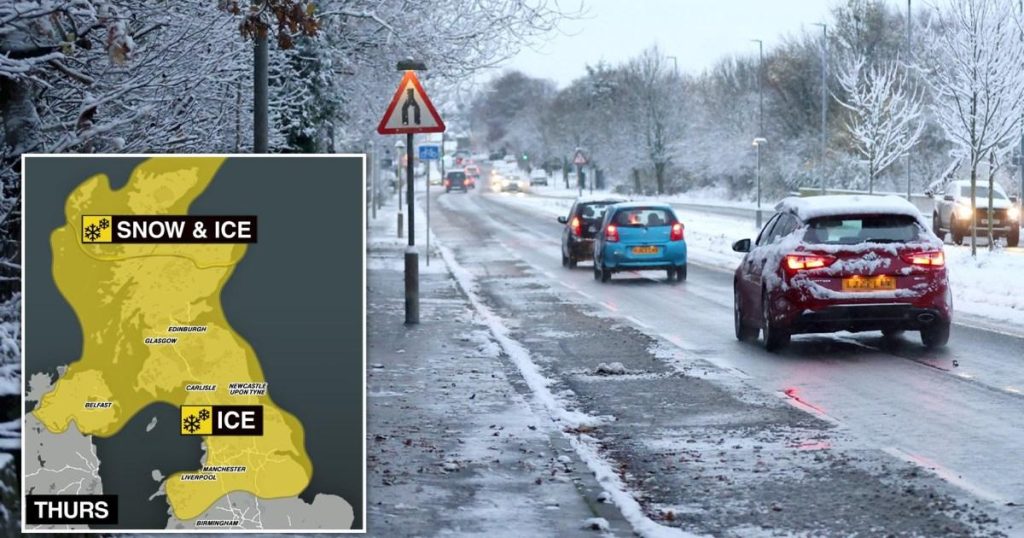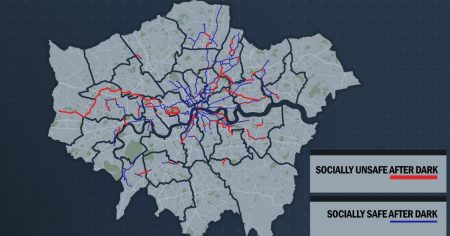The UK is bracing for a severe cold snap over the weekend and into early next week, prompting a rare amber health alert from the UK Health Security Agency (UKHSA) for all of England. The alert signifies the potential for significant health impacts, including a rise in deaths, particularly among vulnerable groups like the elderly and those with pre-existing health conditions. The UKHSA warns of increased demand for health services and difficulties maintaining recommended indoor temperatures in hospitals, care homes, and other facilities. Staffing shortages due to travel disruptions and impacts on other essential sectors like transportation and energy are also anticipated. This amber alert underscores the seriousness of the impending cold weather and the need for proactive measures to protect vulnerable populations.
The Met Office has issued a combination of amber and yellow weather warnings encompassing nearly all of England and Wales, as well as parts of Scotland, for Saturday, Sunday, and Monday. These warnings predict widespread snowfall, with accumulations of around two inches anticipated across the Midlands, Wales, and northern England. Higher elevations, particularly in Wales and the Pennines, could see significantly more snow, potentially reaching 20-30 centimeters. Temperatures have already plummeted below freezing across much of the UK, with some areas in Scotland experiencing lows of -10°C. The combination of snow and strong winds is expected to create challenging travel conditions, particularly on higher-level routes, due to drifting snow. The Met Office advises checking road and rail conditions before embarking on any journeys.
The impending cold snap has also brought renewed focus on the government’s decision to restrict winter fuel allowance payments to only the poorest pensioners. Age UK’s director, Caroline Abrahams, expressed concern, stating that the charity has already been contacted by elderly individuals worried about how they will cope with rising heating costs. She urged older people to prioritize their health and warmth, even if it means exceeding their heating budgets, and emphasized the responsibility of energy companies to provide assistance to those struggling. Local councils may also offer support, highlighting the need for a multi-pronged approach to protect vulnerable individuals during this cold weather event.
The British Red Cross has issued guidance on essential items to have on hand during periods of severe winter weather. Their recommendations include a first aid kit, batteries, a torch, food supplies, a battery-operated or wind-up radio, essential medications, writing materials, a penknife, a whistle, spare glasses or contact lenses, spare keys for home and car, and baby or pet supplies as needed. Copies of important documents like insurance policies and birth certificates should also be readily accessible. This preparedness advice aims to ensure that individuals are equipped to handle potential emergencies and disruptions caused by the extreme weather.
The severe weather conditions have already caused disruption in some parts of the UK. A major incident was declared in Greater Manchester earlier this week due to heavy rain and flooding, leading to evacuations and closures of train lines and roads. Although the focus has now shifted to the cold snap, the risk of flooding persists in some areas. The Environment Agency maintains active flood warnings and alerts, urging continued vigilance and preparedness. Images of overturned cars and abandoned vehicles in snowy and icy conditions illustrate the hazardous travel environment and underscore the importance of heeding weather warnings and avoiding unnecessary journeys.
The confluence of extreme weather events, including heavy rain, flooding, and now a severe cold snap, underscores the increasing challenges posed by a changing climate. The amber health alert, combined with widespread weather warnings, highlights the need for both individual preparedness and robust societal responses to protect vulnerable populations and maintain essential services during periods of extreme weather. The debate surrounding winter fuel allowances for pensioners further underscores the complex interplay between social welfare policies and the impacts of climate change on vulnerable groups. As the UK navigates this challenging period, it reinforces the urgency of addressing climate change and developing effective strategies for mitigating its impacts on individuals and communities.











